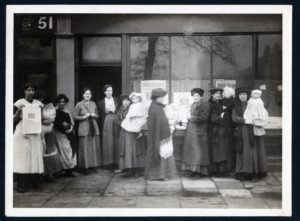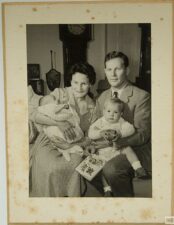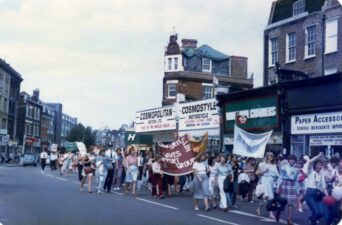In 2018 I carried out some research at Tower Hamlets Local History Library and Archive for the Women’s Hall Exhibition, an event staged to showcase the incredible work of the East London Federation of Suffragettes (ELFS). Set up by Sylvia Pankhurst, the ELFS was a breakaway organisation from the Women’s Social and Political Union. Sylvia Pankhurst regarded woman’s suffrage as part of a general struggle for social equality and justice for all, a conviction which led to her future as a socialist and anti-colonialist activist. When World War One broke out, Sylvia harnessed ELFS to the peace movement and a social welfare programme to relieve the privations inflicted on the population of the East End by the war.
While I was scanning the minutes of the ELFS committee meetings, I kept coming across the name ‘Rosaline McCheyne’. The minutes report her regular attendance and the many duties she performed in the Bromley branch of ELFS between 1914 and 1916, but very few of her own words are recorded there.
Intrigued, I began to dig a little deeper. My subsequent investigations uncovered an individual who made a real difference to the lives of women and children of the East End, whose unstinting efforts earned her little in the way of recognition or thanks. While her actions did not put her in the limelight, they required a tremendous degree of dedication and courage.
McCheyne’s contribution to ELFS’ programme was multifaceted. She was joint manager of the Bromley District Office and in this capacity was responsible for a record number of sales of the ELFS’ official newspaper, the Woman’s Dreadnought in July 1915. But the greatest impact McCheyne made on the lives of women and children in the East End was as joint manager, with a Mrs Mantle, of the ELFS’ Mother and Baby Clinic at 53 St. Leonard Street. This was life-saving work. The clinics were set up in response to the terrible privations inflicted on children and babies by the outbreak of World War One in 1914. Children starved as milk supplies dried up and racketeers inflated prices.
Initially, ELFS established free milk distribution centres to feed the hungry babies. It quicky became clear, though, that starving infants couldn’t take in and digest nourishment they provided. Mother and Baby Clinics were established around the East End to teach women special feeding techniques and how to keep records of their children’s intake. They also distributed free barley and eggs, and employed nurses and doctors to offer free medical care.
The May Day celebrations held in Hackney’s Victoria Park on 24 May 1914 also demonstrates the vital role played by more self-effacing members of an organisation dominated by characters like “tough” Annie Barnes and Nellie Cressall, future Mayor of Poplar Council.
On the day of the rally, Pankhurst knew the police would be arriving at the park to arrest her, and so she deployed a number of her supporters to chain themselves together and form a bodyguard. The police treated them with appalling brutality and a number were arrested and taken to Bow Police Station.
Mrs McCheyne managed ELFS’ bail fund as part of her administrative duties, and was tasked with spending that Sunday evening down at Bow Police Station, bailing out those women whose family responsibilities made it impossible for them to remain in custody. All the administrative skills required to act as Bromley’s Joint Honorary Secretary and serve on the ELFS Social Committee – timetabling, record-keeping, co-ordinating and directing others – were indispensable to the smooth day to day running of the federation. These were the legacy of her life as a post office clerk.
In fact, there was some social distance between Mrs. McCheyne and her fellow ELFS activists. Most members belonged to the labouring classes and lived on low wages in slum dwellings, where families of up to fifteen members could be crammed into two rooms. Her home was a fairly substantial three-storey house at 55 Fairfield Road, Bow, which she shared with her three children, husband Herbert and a lodger. Herbert had a good job as a wood work instructor employed by the London County Council’s Technical Education Panel, whereas most men in the locality were working precarious, irregular hours in dangerous conditions.
Rosaline’s descendent, Anne Padfield, surmised that she must have been moved by the plight of the women she saw in her street every day. Down the road at 7-9 Fairfield Street, the presence of the Poplar Union distributing ‘outdoor relief’ under the poor law system represented a constant reminder of their indigence. It is also worth noting that McCheyne was 18 when the girls and women working at the Bryant and May match factory staged their famous strike only a short walk away from her house.
Her efforts were rewarded with this warm, eloquent tribute, almost certainly penned by Sylvia Pankhurst for the Woman’s Dreadnought, which sums up Rosaline McCheyne’s contribution to the cause:
“Mrs McCheyne and Mrs Mantle have carried on in the most splendid way, the work of our Bromley Office and Baby Clinic at 53 St. Leonard Street, ever since these were started. Now we regret to announce that Mrs McCheyne is compelled to relinquish her work there as she is obliged to leave the district.
All the ELFS’ members know Mrs McCheyne, for she was one of our first recruits in East London, and has always been one of our hardest workers, having served on the ELFS Social Committees and in many other ways as well as Joint Honorary Secretary in Bromley.
We all thank her and hope that we shall see her from time to time.”
Woman’s Dreadnought, 24 July 1915
The minutes show that Rosaline did, indeed, return from time to time and she is last mentioned on 21 February 1916.
In September 2018 I had the great good fortune to meet Rosaline’s relative, Anne. But our initial conversations revealed a mystery: McCheyne did not leave the East End in 1915. In fact, she stayed there until 1925, when the McCheynes moved to Forest Drive, Leytonstone. Did she burn out? Maybe her husband, Herbert, a keen Conservative supporter, made participating too difficult to carry on with. Perhaps she was fed up with growing strife recorded in the committee meetings’ minutes? Or maybe she didn’t share Pankhurst’s increasingly socialist agenda. We could only speculate.
However, Anne did have answers to my questions about Rosaline’s later life and what became of her family. Rosaline died in 1954 at the good age of 84 and spent the latter years of her life in leafy Upminster at the end of the District Line. Her sons survived the Blitz and were content to settle in suburbia and take up steady, regular work in clerical positions. Meanwhile Georgina built a career as a lecturer in pattern cutting and tailoring in one of Essex’s four technical colleges, now the site of the Dagenham campus of East London University. Her professional skills also guaranteed first prize for Anne in any fancy dress competition she entered. Anne has vivid memories of a kindly aunt with passions for playing the piano and the novels of Charles Dickens who used her creative imagination to enthral Anne and her siblings with the bed-time stories their mother had no time to tell.
Jane McChrystal is the author of “The Splendid Mrs McCheyne and the East London Federation of Suffragettes” published by the Choir Press, 2020.
The photo of Mrs McCheyne is reproduced with the kind permission of Norah Smyth’s great nephew, Paul Isolani Smyth. The photo is held at the Institute of Social Studies in the collection of Sylvia Pankhurst’s papers and was sourced from a digital reproduction provided to the author by Tower Hamlets Local History Library and Archive.
Sources
The complete run of the Woman’s Dreadnought is available for consultation at Tower Hamlets Local History Library and Archive
ELFS Committee Meeting Minutes between 28 February 1914 and 21 February 1916, transcribed by Rosemary Lucas
Harrison, S. 2012. Sylvia Pankhurst: the Rebellious Suffragette. Golden Guides Press.
Jackson, S and Taylor, R. 2014. Voices from History: East London Suffragettes. The History Press.


